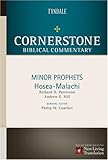
It’s time for my another review from volume 10 of the Cornerstone Biblical Commentary.
Introduction
Zechariah is one of the longer minor prophets, and despite being easy to date, offers a number of challenges to commentators due to the variety of hermeneutical approaches that could be taken to the visions and “proto-apocalyptic” material. Hill briefly describes four options (preterist, futurist, historicist and idealist), and in the commentary he (very) briefly summarises what the preterist and futurist interpretations of the passage in question are. He hints that he views many of these prophecies as having a dual fulfilment.
The introduction is slightly longer than some others in this series, allowing Hill to discuss the relationship of chapters 9-11 and 12-14 to the rest of the book. Hill considers it entirely plausible that they were written by Zechariah at a later stage of his life.
Zechariah and Haggai were prophesying in the same period, and while Haggai exhorted the people to rebuild the temple, Zechariah’s focus was on a call to repentance and spiritual renewal. His central theme is encouragement although the book also includes rebuke and exhortation. Zechariah’s theological concerns include right relationship with God, covenant renewal, social justice, restoration of divine presence and the enabling of the Spirit. Zechariah portrays God as a covenant-making and a covenant-keeping God.
Commentary
As promised in the introduction, Hill does not lay out a variety of possible interpretations of the visions in the first section of the book. Space would not permit it in a commentary series of this type in any case. Instead, he focuses on explaining the meaning of the Biblical text, and highlighting the key theological truths that come out of the passage. The brief sentences at the end of each section outlining the preterist and futurist views tend to leave you with more questions than answers.
In Zechariah the translation choices of the NLT often require a little more explanation in the commentary. For example, “I am jealous … with great jealousy” in Zech 1:14 is translated as “My love is passionate and strong”, or in Zech 1:6 the NLT smoothes over an ambiguity concerning who is speaking, which more literal translations such as the ESV retain. But the NLT does make the reader’s job a lot easier, particularly when dealing with the vivid imagery found in Zechariah.
In several places, Hill highlights messianic titles (e.g. ‘servant’, ‘branch’) and pictures (e.g. priest, king, shepherd), and shows the way in which Jesus fulfils them (at least partially) in his first advent and (eventually completely) in his second advent.
In the latter part of Zechariah (chapters 9 onwards), the centre of gravity shifts slightly, with the ‘Notes’ section more detailed, and the ‘Commentary’ section being used to pick out key theological or application points. So for example, the commentary section for chapter 12 only really touches on Zech 12:1 and Zech 12:10. Over the course of the book, these theological reflections manage to cover a broad range of topics, and do a good job of showing how Zechariah builds on the prophetic hope held forth by Jeremiah and Ezekiel.
Conclusion
Overall I found this a helpful guide to Zechariah’s message. One of the big strengths of the Cornerstone series is the attention to finding links with the message of other books, both in the Old and New Testaments. Hill may not have explained everything in Zechariah, but he has taken us a step in the right direction by connecting the main points of the prophet’s message with the big picture of the whole Bible’s teaching.

